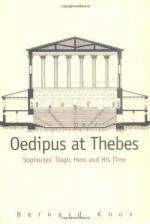|
This section contains 1,523 words (approx. 6 pages at 300 words per page) |

|
Before and after Oedipus's Final Submission to the Gods
Summary: The play centers on Oedipus, a man of great compassion and intelligence who was also a man of great pride. Through his intelligence, he managed to solve a riddle no one else had been able to solve. This resulted in freeing Thebes from the sphinx that had been oppressing the land and securing for Oedipus both the kingship of Thebes and Jocasta, the late king Laius's widow, for his wife.
In ancient Greece, plays were more then simply a form of entertainment. "Athenian drama was supported and financed by the state. (...)Greek theater was directed at the moral and political education of the community." (Kennedy and Gioia, pgs 1357-1363) Sophocles understood this, and dissipated any pollyanic view of society by presenting us with plays that were intended to teach. Sophocles's Oedipus the King issued a warning for those who foolishly believed that they could challenge the forces of nature. Sophocles was known for presenting characters that are fluid not static. So it should come as no surprise that the Oedipus the reader encounters at the outset of the play, an extraordinary leader, but one who's pride has lead him to challenge his fate, has changed by the end of the play. He comes to realize that all his efforts to change the outcome of his life were acts...
|
This section contains 1,523 words (approx. 6 pages at 300 words per page) |

|


